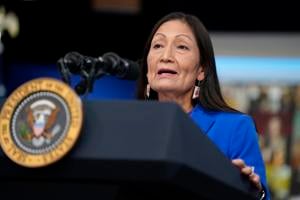Washington state begins to purge ‘squaw’ from place names

(The Center Square) – The Washington State Committee on Geographic Names (COGN) has started work on a federal proposal to rename 18 geographic features in the state which include the name “squaw.” It’s part of a nationwide effort to rid federal lands of a term the U.S. government has deemed a racial slur for Native Americans.
In November, Deb Haaland, secretary of the U.S. Department of the Interior (DOI), signed two orders creating administrative bodies to review and replace derogatory geographic feature names across the country.
Last month, the DOI announced a list of candidate replacement names for more than 660 geographic features across the nation with the name “squaw” and an opportunity for public comment to recommend and review proposed replacement names. The 60-day comment period began Feb. 23.
At a special March 7 virtual meeting, the COGN unanimously passed two resolutions. One approved writing a letter to the Department of Natural Resources and the DOI supporting the federal government’s goal, while acknowledging the federal process the state is working within and the difficulties that presents.
The other resolution approved crafting a press release to keep the public informed of what’s going on.
The biggest challenge: implementation issues related to the federal government’s shorter public comment timeline as compared to Washington state’s more deliberative process, which has already produced some interesting initial outcomes.
“The other thing that I have noted, about the federal proposal that is currently before us is that the methodology used to select alternate names has produced some troubling results,” explained COGN Chair Sara Palmer. “The one that stands out for me that is at the top of the list we have been provided where we would take a lake that is currently named, admittedly in a derogatory way, to commemorate indigenous women, and rename it White Lake.”
Palmer said the committee retains the ability to review any federal names through the state’s normal process.
Given the mix of federal and state involvement in the renaming process, there was some disagreement about how best to proceed.
Several members of the committee – but not all – did not want to speed through the process to satisfy the federal government.
“It seems to me like we let the feds take care of Problem A, and we let our process develop with regard to Problem B,” committee member Dean Foster said.
Mike Iyall, a member of the Cowlitz Indian Tribe, concurred, noting that any names the federal government decides on should be looked at as interim suggestions.
“Unless they’re a catastrophe, I think we let the process take its pace,” he said. “I think heavy emphasis is on let the process work at its own pace. There is no reason to attempt anything like rush, because this will not rush.”
Putnam Barber agreed: “We don’t need to rush into it.”
Grant Smith had a different take.
“I don’t see any reason why we should follow our normal procedures in something that is really quite not normal,” he said. “I think we have to recognize the urgency of this issue.”
Still, Smith recognized there could be a certain level of inconsistency no matter the results of the renaming process.
He pointed to Latah Creek, also known in Hangman Creek, a large stream in eastern Washington and north central Idaho, as an example. Washington state and Spokane County both approve Latah Creek as the official name, while the federal government still identifies the creek as “Hangman.”
Mary Schaff said the federal government has gotten the message and is willing to work with states’ various processes for reviewing and replacing racially insensitive names.
“It’s because they have heard feedback from the states saying, ‘Whoa, whoa, whoa, you’re doing an end-around over all of our processes about – in – community engagement,’ that the feds have now said, ‘Alright, you don’t like the name we assigned. Just consider that a replacement name, and you guys go ahead and do whatever you need to do afterwards,’” she explained.
Schaff translated what’s going on from the perspective of the federal government.
“This is their way of saying, ‘Yes, we’re being dictatorial about what we’re doing, but you guys can fix it if you want,’” she said.
The next regular meeting of the COGN is scheduled for April 26.
Disclaimer: This content is distributed by The Center Square

